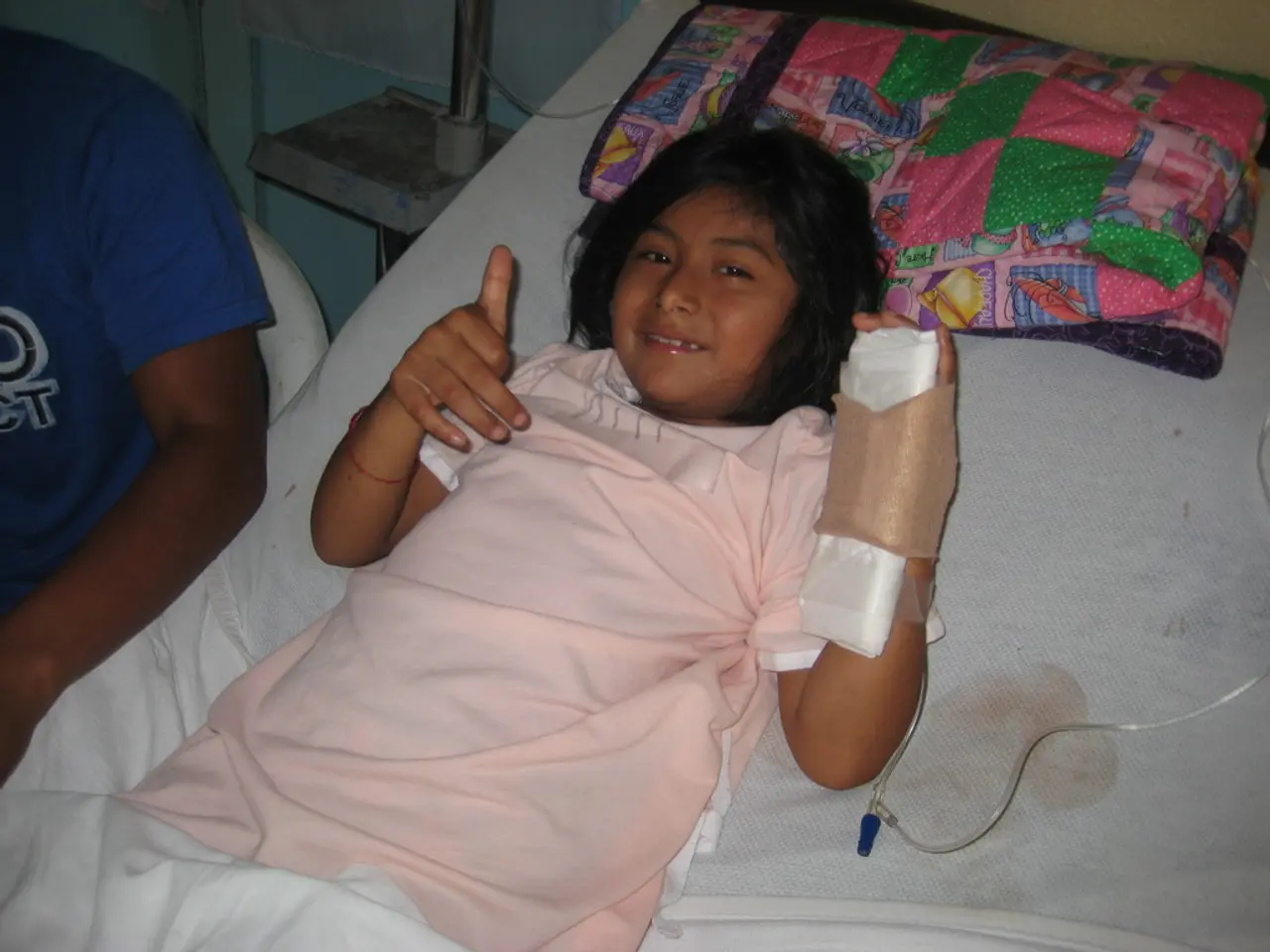Medical professionals advocate for regular Sexually Transmitted Infection screenings in a clinical setting
In recent years, local cases of syphilis, a sexually transmitted infection (STI), have shown a slight increase, particularly among adolescents and young adults in Taiwan. According to the Centers for Disease Control (CDC) in Taiwan, there were 5,826 cases of syphilis reported in the first seven months of this year, marking a 7% increase from the same period last year[1].
The increase is significant, with 1,772 reported cases in people aged 13 to 24 last year, representing a 19% rise from the previous year[1]. From January to July 2025 alone, 1,126 cases were reported in this age group, representing a 14% increase compared to the same period in the previous year[4].
The main cause of syphilis transmission is through unprotected sexual contact[4]. The increase is likely linked to risky sexual behaviors, lack of awareness, and insufficient screening in adolescents and young adults[1][4].
Symptoms and Stages
Syphilis has different signs and symptoms as it progresses through primary, secondary, latent, and tertiary stages. During the primary stage, people might develop painless ulcers or round and firm sores on the genitals that heal in a few weeks[2]. During the secondary stage, people might develop rashes on their palms, the bottoms of their feet, or anywhere on their body, and might also experience hair loss, headaches, fatigue, weight loss, and muscle aches[2].
Untreated syphilis after three to seven years might develop into tertiary syphilis, which can affect many different organ systems[2]. In some cases, syphilis can lead to serious complications such as neurosyphilis or cardiovascular syphilis[2].
Prevention and Treatment
Prevention focuses on education, condom use, and screening. Consistent and correct use of condoms during sexual activity, regular screening for STIs, especially for sexually active individuals in high-risk groups, prompt treatment of infected individuals and their partners to prevent reinfection, and increased public health education targeting young people about syphilis symptoms, transmission, and risks are all crucial in preventing the spread of syphilis[1][4].
Gonorrhea and syphilis can be cured with the right treatment. Early syphilis is treated primarily with intramuscular benzathine penicillin G. For individuals allergic to penicillin, alternative antibiotics such as doxycycline may be used[4].
Diagnosis and Guidelines
Diagnosis involves clinical examination and serological testing, including non-treponemal tests (e.g., RPR) and treponemal tests for confirmation[4]. The CDC, along with the Infectious Diseases Society (IDS) and other medical associations, published "Guidelines for the Clinical Diagnosis, Treatment, and Prevention of Syphilis in Adults in Taiwan," providing standardized treatment guidelines for gonorrhea and syphilis[3].
Clinical STI screening is urged by Taiwanese doctors to catch cases earlier and reduce transmission[1]. In July 2021, the CDC launched a free anonymous STI consultation program, including free rapid syphilis tests for people aged 24 or younger at 13 hospitals across the nation[3].
Recent Cases
Recent cases highlight the importance of early detection and treatment. A woman was hospitalized for a suspected case of meningitis due to a persistent headache, but was later diagnosed with secondary neurosyphilis after developing hair loss[5]. Another woman in her 30s was diagnosed with secondary syphilis, likely contracted from her boyfriend who admitted having an affair[5].
In the month since the program started, 382 people have used the service, including 256 who received a syphilis screening, and 10 of whom were tested positive[5]. It is crucial to have standardized treatment guidelines for gonorrhea and syphilis to ensure effective treatment and prevent the development of antibiotic-resistant strains.
In conclusion, the rise in adolescent and young adult syphilis cases in Taiwan is a public health concern that requires immediate attention. Prevention efforts should focus on education, condom use, and screening, while early detection and treatment are crucial in preventing complications and reducing transmission.
[1] CDC Taiwan, Syphilis Surveillance Report, 2020. [2] CDC Taiwan, Guidelines for the Clinical Diagnosis, Treatment, and Prevention of Syphilis in Adults in Taiwan. [3] CDC Taiwan, Press Release: Free STI Consultation Program Launched. [4] CDC Taiwan, Syphilis Surveillance Report, 2021 (Jan-July). [5] CDC Taiwan, Case Report: Secondary Syphilis.
- The increase in syphilis cases in Taiwan, particularly among adolescents and young adults, underscores the need for improved mental health awareness, as sexual health and neurological disorders, such as neurosyphilis, can significantly impact a person's overall health and wellness.
- Awareness of medical conditions like syphilis in Taiwan should extend to mental health issues, as undetected syphilis can lead to serious implications like neurosyphilis, a neurological disorder that affects the brain and spinal cord.
- In light of the rise in syphilis cases among adolescents and young adults in Taiwan, there is a growing need for comprehensive health and wellness education programs that address not only sexually transmitted infections but also mental health, to help individuals make informed decisions and prevent potential health complications.




